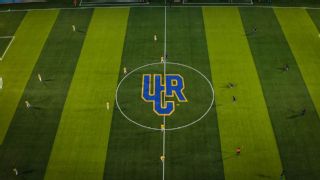|
Every day spent in the shadow of the coronavirus pandemic seems to reveal a new financial problem for another Division I program. Tamica Smith-Jones is no longer surprised to see those headlines -- she's living one. Smith-Jones, the athletic director at the University of California, Riverside, located an hour east of Los Angeles, entered a campus building last week and tried to convince the school's budget executives not to eliminate every team on campus. The Big West school stands to lose all 15 sports (seven men's programs and eight women's programs), more than 300 student-athletes and the $23 million budget line attached to them in a cost-saving measure. "[Elimination] would put us in the category as the only University of California school to not have sports," Smith-Jones said. "I don't think that's something we want to be known for." In August, officials at UC Riverside listed the move as one option to address its financial challenges in this unprecedented chapter for college sports. Jones and her peers within the department, however, hope to convince UC Riverside's power brokers to consider an alternative that would involve a combination of increased student fees and expanding the department to encompass the school's recreational programs. As many schools wrestle with conversations about their financial futures, some have made drastic decisions, including eliminating some sports programs. Power 5 universities such as Stanford and Minnesota have eliminated multiple sports. Ohio State recently announced a $107 million deficit tied to the pandemic. Oregon State plans to slash its operating budget by 20% this year. UC Riverside has faced the same hurdles as other non-Power 5 schools that lack lucrative football engines. In August, the school's budget advisory committee, which will make the final recommendations to Chancellor Kim A. Wilcox, listed elimination of athletics as a possibility because "they are not viewed as critical as other campus activities."  Smith-Jones said that view dismisses the impact the collegiate experience has made for athletes on a campus where minorities are the majority and 83% of the students receive some form of aid. "It changes the trajectory of your life," she said. "And not just yours, but your whole family's. These students have been passionate about this." Katie Wong, a sophomore soccer player, said her scholarship at UC Riverside has allowed her to compete against elite opponents and bond with her teammates. "To be given this opportunity to play Division I soccer against all of these great women, to lose that would be devastating for me and other student-athletes." But the financial gap within the university's budget is not something that can be ignored. According to USA Today, UC Riverside is the most subsidized Division I program in the country (the list includes 227 programs) with more than 90% of its $23.2 million in annual revenue coming from student fees ($2.3 million) and institutional support ($18.7 million). School officials have pointed to those numbers as reasons to consider elimination of the athletic department, as they attempt to address a projected loss in state funds of $32 million. "Those facts don't leave us in a very optimistic position for the future," Wilcox said in a July video about the school's financial future. "It means we're going to have to make a lot of very difficult decisions about our operations and how we're going to manage to support them with fewer and fewer financial resources." The chancellor is expected to make a final decision sometime before the end of the calendar year but possibly as early as next month. The pandemic has highlighted the collective and continuous financial problems for the "have-nots" in Division I athletics. Per USA Today, while 40 collegiate athletic departments generate at least $100 million in revenue, at least 117 universities fall below the $30 million mark. UCR is one of six athletic departments in the Big West that fit that description.  That divide and the gap it creates were highlighted in a recent Knight Commission study, where a majority of Power 5 leaders surveyed said they were "very or somewhat likely" to support a fourth NCAA division for the wealthiest schools in every sport but basketball. Another 59% of respondents said they spent money to support FBS football because they want to "keep up" with other programs. "It's clear from our survey that college leaders acknowledge that the status quo is no longer acceptable," Knight Commission co-chair Carol Cartwright, president emeritus at Kent State University and Bowling Green State University, said in a prepared statement. "This survey demonstrates that broad support for a new model for Division I is even more pressing after the pandemic, as college athletics leaders realize their business models must change -- and radically." B. David Ridpath, an associate professor of sport management at Ohio University and a former assistant athletic director at Marshall, said mid-major and low-major programs with budget issues could alleviate their concerns if they adopted a Division II or Division III model with partial or no scholarships for athletes. He said those programs, which don't enjoy the TV revenue available to Power 5 schools, would not see a significant difference in their operations or marketability if they dropped a level or two. Ridpath dismissed the long-held "front porch" philosophy within collegiate athletics, wherein schools expend major resources to build and market an attractive athletics program in an effort to attract attention from prospective applicants -- and compete with other universities. "I would not recommend dropping athletics," he said. "But the 'front porch' theory is one that is largely unproven. Any gains you get are immediately negated by the investment in the arms race." While UC Riverside's fight centers on financial numbers and budget concerns, the athletic department's leaders have focused on the broader impact of athletics on campus and the young women and men who would lose critical opportunities without sports. Almost 90% of UC Riverside's students are minorities and more than half are first-generation students. The makeup of its athletic teams mirror the same demographics. University officials at UCR have stressed that they haven't reached any conclusions, however sources in the athletic department told ESPN they don't feel that their interests have been represented. They worry that UCR power brokers might not be swayed against elimination. "My argument is that any nationally relevant university has athletics," said Mike Magpayo, UC Riverside's first-year men's basketball coach and the first Asian-American head coach at the Division I level. "It's an essential ingredient for any nationally relevant university and it has the ability to elevate the university." A social media campaign (#KeepUCRAthletics) has generated more than 250,000 impressions. A video created by the athletic department, which includes a shoutout by Los Angeles Dodgers pitcher and UCR alum Joe Kelly, has more than 14,000 views and a Change.org petition has received more than 15,000 signatures. For Raena Robinson, a junior softball player at UC Riverside, eliminating athletics would affect the camaraderie she shares with her peers on campus, she said. "It's just losing and erasing a staple within our culture," said Robinson, who is the first person in her family to enroll in a four-year university. "It's athletics that bring people together in more than one way." It's those arguments that anchor Smith-Jones' pitch to the leaders on campus. Plus, she believes her department has devised a respectable compromise for a school that she says has not raised student fees in more than 20 years. At $105 per student, the Highlanders fall more than $200 below the national average in Division I athletics, per officials. Overall, more than $1.2 billion in student fees were collected at Division I schools to sustain athletic programs in 2018, per NCAA data. But the Division I landscape has never been more unified in its financial uncertainty. The pandemic has impacted Big Ten and Big West schools alike. Ridpath said the pandemic could create a reckoning throughout college sports that will force schools across the country to reevaluate their programs and ambitions. "I want to be optimistic that this will force a reset in collegiate athletics," he said. "It's time for schools to be who they are." That sentiment is part of why the UC Riverside athletics staff wonders how the coming weeks and months will unfold, with no real precedent for a decision that could alter the lives of hundreds of staffers and student-athletes. Those stakeholders don't believe the school will enjoy the savings it anticipates in a future without athletics, and are confident the university would be adversely affected. "Devastating is an understatement," said Wes Mallette, chief of staff and senior associate athletics director at UC Riverside. "While this is a once-in-a-century pandemic, we clearly believe that cutting an entire athletic department is not the answer."
|


